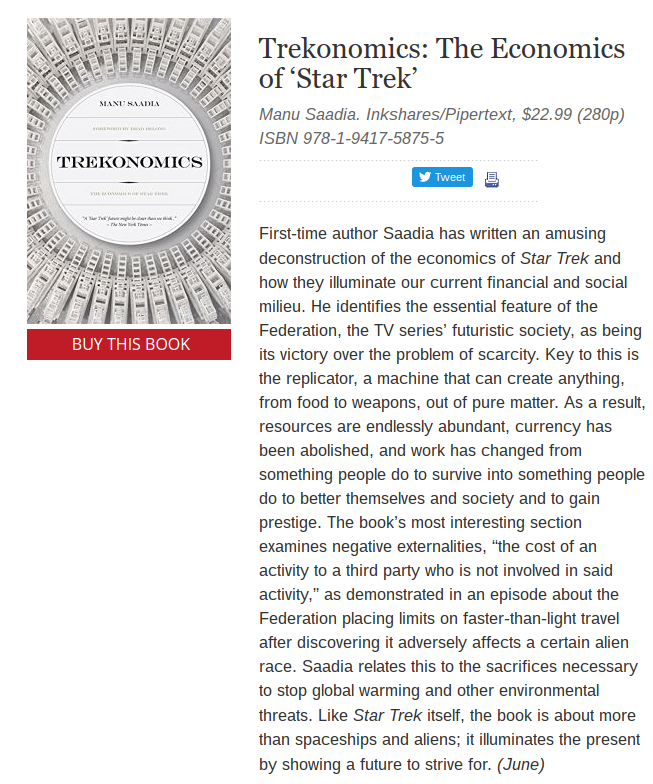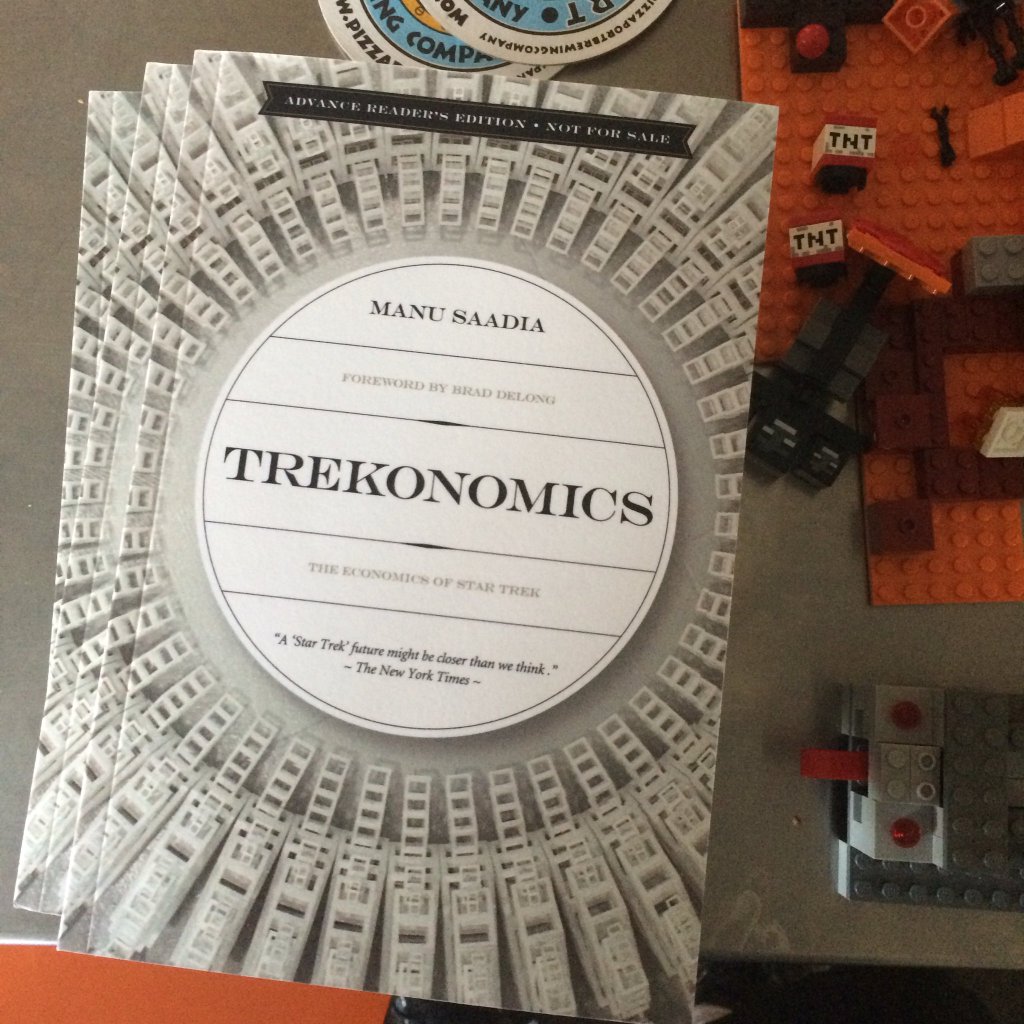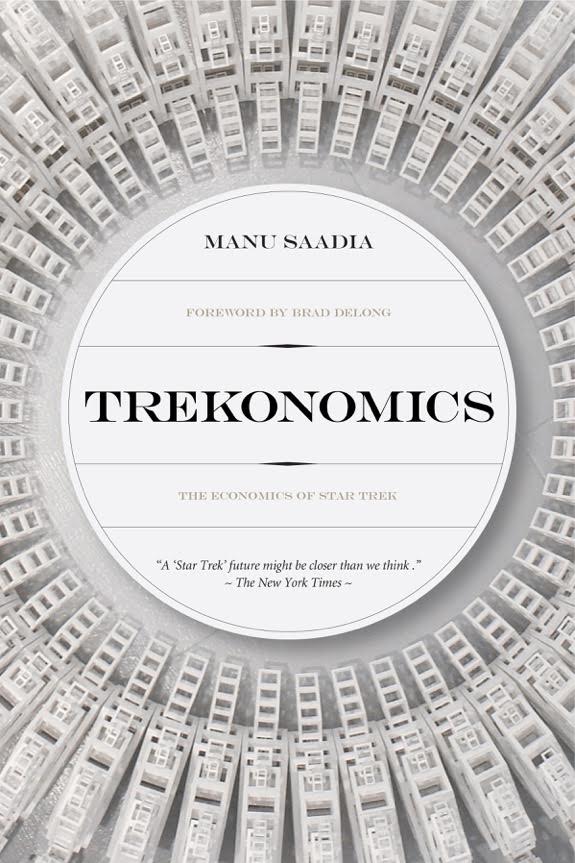Trekonomics review in Publishers’ Weekly
Dear friends and backers of Trekonomics,
I am delighted to let you know that the first reviews are in. In particular, here is a nice one from Publishers’ Weekly (read in full here: http://publishersweekly.com/978-1-9417-5875-5). And this is the screenshot for your convenience.
We will be announcing a series of events shortly!
In the meantime, as usual,
Live long, and prosper!
Manu
An interview of yours truly in Atlas Obscura
Dear friends, backers and readers of Trekonomics,
I had the chance to do an interview with Eric Grundhauser of Atlas Obscura (one of my favorite destination on the internets). The story gives a nice overview of the book’s general argument. Strangely enough, the article got picked up and condensed by the Onion’s AVClub (another most excellent online outlet). Wisely or not, the AVClub has a comments section, which promptly got populated by more than 700 comments. Read at your own peril!
In other news, the cover is finished and the book has been proof-read for the 100th time. Here is another sneak peek (a picture of the promotional galleys I just received).

The final book’s files are being sent to the printer on March 8. So this is it. The die is cast.
A reminder: for those who have not ordered Trekonomics and who would like to receive their own copy before everybody else, you can pre-order at Inkshares.
There are more articles and interviews forthcoming between now and May.
In the meantime, as usual,
Live Long and Prosper,
Manu
Trekonomics foreword by Brad DeLong
Dear readers, backers and followers of Trekonomics,
It is with great honor that I share with all of you Prof. Brad DeLong’s foreword to Trekonomics. His wisdom and intellectual generosity made this book possible. More importantly, his contribution to making the world a better place cannot be overstated.
Make sure to read excerpts from his upcoming book, "Concrete Economics" (with Stephen S. Cohen) over here: http://fortune.com/2016/02/16/hamilton-jefferson-economy-america/
Concrete Economics’ tag line reads: "History, not ideology, holds the key to growth." I could not agree more. I just pre-ordered the book here (release on March 1st): http://amzn.com/1422189813. Give it a try, you will not be disappointed.
And now, without further ado, here is his foreword.
Manu
===================
FOREWORD
“Live long and prosper.” “Beam me up, Scotty.” “The needs of the many outweigh the needs of the few, or the one.” “Fascinating.” “Make it so.” “Logic is the beginning of wisdom, not the end.” “I’m a doctor, not a bricklayer.” “Highly illogical.” “You can stop it!” “Stop it? I’m counting on it!”
Over the past half century Star Trek has woven itself into our sociocultural DNA. It provides a set of powerful, striking, and beneficial ideas that help us here in our civilization think better. Even those of us who are economists.
Why should the imaginary dreams of science fiction help us think better?
Back in 1759, the man who was to become the first economist, young Adam Smith, a Scottish moral philosopher on the make, wrote in his Theory of Moral Sentiments of how “a stranger to human nature, [seeing] the indifference of men about the misery of their inferiors . . . [would conclude that] pain must be more agonizing, and the convulsions of death more terrible, to persons of higher rank, than to those of meaner stations.”
There is no such alien stranger. Smith is telling us of somebody who does not exist. It’s a very short, eighteenth-century science-fiction story. Why? Because we love to tell one another false stories, to converse about imaginary people, be it in philosophical treatises or in television serials. It is what we do as humans.
If an alien intellect, vast and cool and unsympathetic (or vast and warm and sympathetic), were to scrutinize us from afar, it would inevitably conclude that telling each other false stories is a major part of what we are, and it would wonder why we communicate—or miscommunicate—in this way.
Everyone is engaged in dream-work. Everyone chatters about their imaginary friends. Some are ascribing agency, motivation, and intelligence to patterns of societal forces that are the emergent properties of distributed interactions. Others are writing—or filming—fiction.
Our fictions are, collectively, the dream-work of humanity. We dream these dreams to amuse ourselves, but also so that we will be more sane when we awake.
No wonder, then, that investors and economists also gab about imaginary friends, frenemies, and unfriends with names like “Ms. Market” and “confidence” and “global risk tolerance” as they try to understand things called “asset prices.” They too are doing dream-work.
But in some ways the most profound thinking, the deepest dream-work, is being done by science fiction. That’s because science-fiction writers and fans are explicitly aware that what they are engaged in is humanity’s dreaming.
The Prime Directive of Star Trek: The Original Series was a way to process America’s 1960s misadventure in Vietnam. I first recognized that Star Trek was a very different kind of show back in the 1960s, when at the end of “Arena,” Kirk neither killed nor civilized nor brought democracy to the Gorn, but let him go to make his own destiny.
Gene Roddenberry mostly wanted to find a way to get people to pay him to make up stories, so that he wouldn’t have to take a job that required a lot of heavy lifting. But he also wanted to tell particular stories. The stories he wanted to tell were those that would be the dream-work for a better future.
He wanted to tell stories of a progressive humanity. He wanted to tell stories about people in a better future in which governmental institutions were smart enough to stay out of Vietnam and people weren’t obsessed with leaky roofs and food shortages. He wanted to tell stories in which racial prejudice was as silly and stupid as it, in fact, is. He wanted to tell stories in which it would be normal for a woman to be if not number one at least number two as first officer of a starship. He wanted to tell stories in which everyone—even the disposable Red Shirts—was an officer, a trained and well-educated professional treated with dignity and respect by her peers and superiors.
In turn, Gene Roddenberry’s successors, showrunners, writers, actors, set designers, and all the rest took on the same project: to do the dream-work of a better future. As North Atlantic civilization bobbled the historical opportunity that was the collapse of the Soviet Empire, Star Trek VI: The Undiscovered Country and Star Trek: Deep Space Nine pointed to better directions. Gene Roddenberry made Star Trek a collective dreaming about a better future, and not just a Western or a medieval romance with lightsabers, whooshing spaceships and exploding planets bolted onto it.
Four hundred years ago, in almost all human societies, being rich relative to your neighbors mattered a lot. If you weren’t rich, you were malnourished—perhaps not getting the nutrients for your immune system to function well, perhaps not getting the calories you needed to reliably ovulate, and probably losing at least one tooth with every baby. And, you were short. In the eighteenth century, Adam Smith’s England was the richest society in the world, yet the orphans sent to sea by the charity that was the Marine Society were close to eight inches shorter than the aristocrats’ sons sent to Sandhurst to become army officers. Plus, your roof leaked.
Today, in the prosperous North Atlantic, food-related public-health problems are no longer predominantly problems of malnutrition and caloric scarcity but rather problems of overabundance. And it is not just in food that those of us in the developed world’s bubble have abundance. You only have to go down to Long Beach and look at the containers being unloaded to convince yourself that our current economic problem is not one of need.
Roddenberry’s dreams, Star Trek’s dreams, help us to think through what it would be like to have a society of abundance, of logic and reason, and of inclusion. A world in which the fearsome Gorn might really be the good guy and in which mortal enemies can become allies. As Ayelborne forecasts to Captain Kirk in “Errand of Mercy”: “You and the Klingons will become fast friends. You will work together.”
For those of us who are fans, it has been (and still is) a wild fifty-year ride. And for those of us who are not, I believe it really matters to listen to Star Trek’s dream-work, and to step into that ongoing, fifty-year conversation.
So with enthusiasm and admiration, I present to you Manu Saadia, and Trekonomics.
Brad DeLong, Berkeley, January 2016
Dear backers, readers and friends of Trekonomics,
This is the cover of Trekonomics.
All my gratitude goes to Jennifer Bostic for her amazing design, and to John Powers for his sculpture. Please note that this is not the final design. There will be a few last-minutes tweaks.
As you may guess from the cover, Prof. Brad DeLong, the great economist and Star Trek fan extraordinaire, is honoring Trekonomics with an original foreword.
Let us know what you think! Your feedback is most appreciated.
In the meantime, with all my thanks,
Live Long, and Prosper,
Manu

Dear backers and friends of Trekonomics,
I just posted the final, revised and expanded introduction to the book (minus a few still-ongoing copy-edits!). Cover will be revealed and shared will all of you this week. We are on schedule!
You may read the new introduction to Trekonomics here:
https://www.inkshares.com/projects/trekonomics/book_segments/introduction-3720
In addition, if you are so inclined, I invite you to read my latest column celebrating the 15 years anniversary of Wikipedia: http://fusion.net/story/256371/wikipedia-15-years-old/.
As always,
Live Long, and Prosper.
M.
The Trekonomics New Year's Update
Dear readers, followers and friends of Trekonomics,
I am very happy to report that after two months of furious rewriting and editing, the final manuscript has been sent for copy-editing. We are on track for our late-spring 2016 release.
A lot of coordination is involved in producing a book. I am discovering the age-old process of designing a cover and gathering all the elements for the book's jacket as well the so-called "front matter" (that is, all the text and pages that are not part of the manuscript itself).
Speaking of the book's front matter, we are planning a neat little surprise. It will be revealed in time (and I will not say anything more lest I jinx it).
The cover is being designed by the incredibly talented Jennifer Bostic (http://www.paperplanestudio.com/) and John Powers (http://johnpowers.us/, as well his essential blog http://starwarsmodern.blogspot.com/). It is an awesome privilege to work with artists of their caliber. We will share the cover design and artwork with all of you as soon as it is blocked and finalized, within the next few weeks.
2016 will mark the 50th anniversary of Star Trek's first airing on NBC. The exact date is September 8 at 8:30PM Eastern Time. For that occasion, the US Postal Service will release a series of four commemorative stamps. Here they are in all their glory:

"Forever" means that they will be forever good for first-class letters, regardless of future price increases. Hopefully, we will be able to ship some of your pre-orders with these stamps on the envelopes.
As a final note, I am happy to announce that I am contributing to Fusion.net's Real Future on a regular basis. You can set your RSS readers to: http://fusion.net/author/manu-saadia/ or follow me on twitter (@trekonomics). My latest piece was on Star Wars: The Force Awakens.
We will be in touch very soon. In the meantime, a happy and felicitous New Year.
Live Long, and Prosper
Manu
Dear all,
The mystery of the Marginal Revolution backer thickens. Here is a note I received from another backer after posting the last update :
From backer AG:
hmmm... they say the best way to get the correct answer on the internet is to post the wrong answer and wait for the correction. A corollary of this rule seems to apply to your search for the lone soul that discovered your book from marginal revolution. I do not mean to cast doubt upon my trek supporting brother in arms from the cold north and yet I too discovered your book from a marginal revolution post. Perhaps something was off during data collection, and I wouldn't put my own mis-click beyond possibility.
This is fantastic. Thank you AG.
And for the record, I would encourage anyone who is interested in economics to read Marginal Revolution every day. Along with Brad DeLong's blog, Marginal Revolution is probably the best economics website out there.
Until the next update,
Live long, and prosper,
Manu

Dear readers and supporters of Trekonomics,